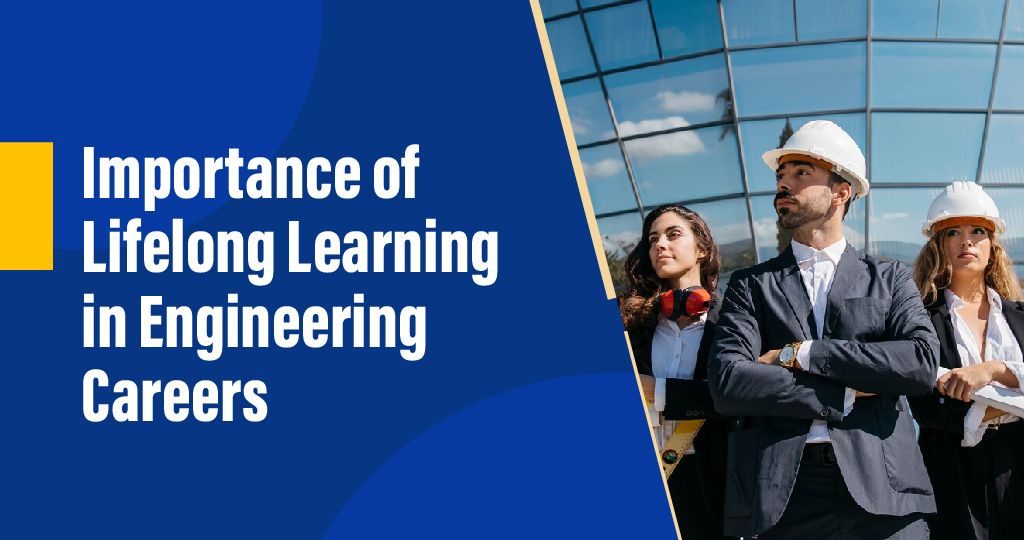
Introduction
Engineering is an ever-evolving discipline. New technologies emerge regularly, and industries experience changes. Engineers must remain open to learning to remain current in their work and excel. So, what constitutes lifelong learning? Learning is pursuing knowledge for personal or professional advancement; it is a prerequisite for engineers.
The Dynamic Nature of Engineering
Engineering is one of the fastest-changing professions. Artificial intelligence, renewable energy, and automation have rapidly changed engineers’ traditional roles. Engineers must keep abreast of the latest tools, methodologies, and trends. Stagnation may mean becoming obsolete in a competitive market without lifelong learning.
Benefits of Lifelong Learning in Engineering Careers
Enhanced Career Opportunities
One of the most significant advantages of lifelong learning is that it helps people stay competitive in the workplace. Those engineers who continue to upgrade their skills have more chances to qualify for various jobs, including research and development and project management.
Innovation and Creativity
Learning new concepts and exploring interdisciplinary fields helps spark creativity. For example, an electrical engineer learning about data science may create innovative technology for a smart grid. The more you know, the more you can link ideas and think outside the box.
Personal and Professional Growth
Lifelong learning develops self-esteem and helps build expertise. Engineers can quickly meet challenges and significantly contribute to their organizations by mastering new skills. Growth in this regard also brings about growth in one’s career and self-fulfillment.
Lifelong Learning Methods for Engineers
Formal Education
Acquiring higher degrees or specialized certification programs through formal learning is one way to build expertise, increase knowledge, and reinforce professional credibility.
Online Learning Platforms
With MOOCs such as Coursera and edX available for engineers worldwide, high-quality education is readily accessible anywhere. Course offerings range from speciality topics such as machine learning or robotics to sustainability engineering and beyond.
Peer Learning and Networking
Through interaction with peers in professional groups or attendance at industry conferences, one is given a chance to learn collectively. Interacting with other individuals mainly allows one to learn and share new ideas with the fellow.
Hands-On Experience
Engineers need hands-on practice in order to hone their engineering skills. Participating in projects or experimenting with new technologies allows engineers to transform theoretical knowledge into real solutions that they can apply immediately in practice.
Challenges in Lifelong Learning for Engineers
Time Constraints
Balancing professional and personal demands takes hard work, but you can overcome this barrier by setting clear goals and managing time efficiently.
Financial Barriers
Education and training usually carry a price tag. Engineers should seek scholarships, employer-sponsored education, or other free or low-cost online information to afford learning.
Staying Motivated
Learning should be a habit. While engineers may sometimes feel frustrated or unsure if they can learn, adopting a growth mindset and cheering for small wins maintains motivation.
Role of Employers in Promoting Lifelong Learning
Lifelong learning can be enhanced through the company because employers have to contribute and make it happen. They do this by offering education, training, and research incentives and giving their employees funds for higher education.
The Future of Lifelong Learning in Engineering
Engineering education of tomorrow is rapidly digitalizing, with trends such as virtual labs and AI tutors creating innovative learning experiences. Engineers of the future require technical skills, communication abilities, and leadership abilities in an ever-evolving global society in order to excel.
Conclusion
Lifelong learning is, therefore, necessary for engineers to be agile, innovative, and leading. In the same vein, engineers would ensure their continued relevance by being cultured toward continuous growth and self-realization. As the world keeps changing and in it, the will to learn becomes the ultimate form of competition.
